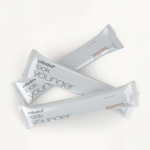Recommended Collagen Supplementation Duration
Collagen supplements have surged in popularity in recent years. Collagen is the most abundant protein in the human body. It provides the structural framework that supports healthy skin, bones, joints, hair, nails, and more. But collagen production starts declining around ages 25-30. Supplements can provide extra collagen from common sources like fish, eggshells, or bovine hides.
Contents:

Proponents claim collagen supplements deliver various benefits:
- Improved skin hydration, elasticity, and dermal collagen density
- Reduced fine lines, wrinkles, and cellulite
- Stronger nails and hair
- Relief for joint discomfort and osteoarthritis
- Faster recovery from exercise and injury
- Possible cardiovascular and gut health benefits
With such a wide range of purported benefits, it's no wonder people are eager to try collagen. But how long do you need to take collagen to see results? Are the benefits temporary or long-lasting? Let's analyze the evidence behind recommended collagen supplementation durations.
Expected Timeline for Results
Most clinical studies on collagen last between 4-24 weeks. Benefits for skin and joints may appear around the 4 week mark. But longer supplementation for 2-6 months seems ideal to notice meaningful improvements. Beyond 6 months, additional collagen likely provides maintenance of results rather than continued enhancement.
For example, in one study participants took collagen peptides for 8 weeks. After just 4 weeks, they already saw increased skin hydration and collagen density versus placebo. But skin continued improving over the full 8 weeks.
In another trial, active adults taking collagen for 6 months had significant increases in collagen biomarkers versus the control group. Knee pain while walking and exercising also decreased.
Other research finds benefits plateau around the 6 month mark. A study of athletes supplementing with collagen for 24 weeks found joint pain relief occurred within the first 6 months. No further reduction occurred between 6-24 months.
Based on the collective evidence, taking collagen consistently for 2-6 months offers a good balance of allowing enough time to see results without unnecessary long-term use if benefits have peaked.
Maintaining Results Long-Term
While 2-6 months of daily use seems ideal for noticing improvements, what about maintaining benefits long-term?
For sustained results, continuing collagen supplementation at a maintenance dosage is likely necessary. Your body will keep destroying existing collagen as you age. Stopping supplements means your collagen levels will eventually start declining again.
One way to maintain gains is alternating collagen supplementation periods with off-cycles. For example, you might take collagen daily for 3 months, cycle off completely for 1 month, then resume again for 3 months.
This gives your body a periodic break while still regularly reinforcing collagen stores. But always consult your healthcare provider before starting and stopping any supplements.
Another option is reducing the supplementation dose rather than discontinuing completely. After an initial loading phase of a higher dosage for 2-6 months, cut back to a lower maintenance amount.
For instance, 10 grams daily for the first 3 months followed by 5 grams daily thereafter. The lower dose continues providing collagen without oversaturating your system.
No definitive research yet outlines exact long-term protocols. But a phased approach allows for periods of focused collagen loading, followed by lighter maintenance. This supports results without constantly needing high doses.
Timing Collagen Around Activities
Beyond everyday use for general wellness, properly timed collagen supplementation may enhance specific activities:
- Pre-Workout - 10-20 grams of collagen 30-60 minutes before resistance training or HIIT may improve endurance and muscle recovery.
- Post-Workout - Another 10-20 gram serving immediately after training provides collagen when muscles need repair.
- Before Bed - 20 grams of collagen 1-2 hours before bedtime may improve overnight tissue repair and regeneration.
- Upon Waking - 10 grams first thing in the morning on an empty stomach maximizes nutrient absorption.
- Before Sun Exposure - Pre-loading with collagen may protect skin from UV damage and burn.
- After Injury - Extra collagen post-injury can support healing sprained ligaments and tendons.
Strategically supplementing around activities leverages collagen's potential workout and injury recovery benefits. Just add activity-specific servings to your daily maintenance dosage.
Indicators It's Time for a Break
While ongoing collagen supplementation appears helpful, taking high doses indefinitely may not be necessary or advisable.
Signs it's time for a break include:
- Gastrointestinal symptoms like heartburn, gas, bloating, diarrhea. This could indicate your body needs a rest from digesting collagen peptides.
- Decreased results over time. Your body may become saturated with collagen, so cycling off can help avoid hitting a plateau.
- Kidney or liver problems. Your doctor may advise discontinuing collagen to see if it provides relief.
- Financial or practical reasons. Collagen supplements can become expensive and inconvenient long-term. Periodic cost and lifestyle breaks are understandable.
- Changes in dietary protein intake. If increasing protein foods, you likely don't need as much supplemental collagen.
Pay attention to signals from your body, lifestyle, and diet. This helps determine reasonable long-term collagen supplementation durations specific to your needs.
Safe Supplementation Limits
Research on daily upper limits of safe collagen intake remains limited. But based on existing evidence:
- Up to 10-15 grams daily for general wellness and maintenance appears safe long-term. Higher doses up to 20 grams daily are likely fine for shorter 2-6 month periods.
- Athletes may safely take even higher dosages of around 30 grams daily to support intense training demands.
- Maximum benefits seem to occur between 10-15 grams per day on average. Beyond 20 grams provides limited additional advantages.
- Excessive intake above 30 grams daily long-term could stress kidney function. Stick with the lowest effective dose based on individual tolerance and needs.
Unless following a doctor's specific guidance, limit general collagen use to 15-20 grams daily. Reduce regular intake if any adverse reactions occur. More is not necessarily better when it comes to collagen dosage.
Consumer Considerations
When supplementing with collagen, keep the following tips in mind:
- Select quality collagen peptides from reputable, transparent brands to ensure safety and efficacy.
- Start with smaller doses around 5 grams daily, gradually increasing to 10-15 grams.
- Take collagen consistently for 2-6 months to allow enough time see results.
- After an initial loading phase, lower doses of 5-10 grams daily help maintain benefits.
- Cycle on and off higher dosage periods, or take occasional weeks off for gut rest.
- Time added collagen around activities for enhanced performance and recovery.
- Watch for signals collagen intake could use a break, like side effects or lifestyle factors.
- Stick with 10-20 grams per day for general wellness, and a maximum of around 30 grams for athletes.
Focus on finding the minimum effective collagen dose and strategic timing that meets your individual needs and goals. Be patient through a 2-6 month initial phase before expecting noticeable benefits.
What Happens When You Stop Taking Collagen? Conclusion
Research indicates taking daily collagen supplements for 2-6 months allows enough time to start seeing results in areas like skin, nails, hair, joints, and workout recovery. Benefits appear to plateau around 6 months for most people.
For maintaining gains long-term, ongoing lower dose collagen or cycling higher dosage periods with off weeks helps avoid hitting a plateau. Properly timing supplemental collagen around activities like exercise, sleep, and sun exposure may further enhance targeted outcomes.
Pay attention to possible signs it's time for a break like side effects or lifestyle changes interfering with collagen use. Unless following medical guidance, general wellness doses up to 20 grams and athlete doses up to 30 grams appear safe. Stick with the lowest effective amount for optimal collagen supplementation duration.
Resources used to write this article
Asserin, J., Lati, E., Shioya, T., & Prawitt, J. (2015). The effect of oral collagen peptide supplementation on skin moisture and the dermal collagen network: evidence from an ex vivo model and randomized, placebo-controlled clinical trials. Journal of Cosmetic Dermatology, 14(4), 291-301. https://doi.org/10.1111/jocd.12174
Choi, F. D., Sung, C. T., Ju, H. S., Lee, S. J., Kim, S. C., & Oh, T. H. (2019). Effects of collagen tripeptide supplement on skin aging in healthy humans: a randomized controlled trial. Journal of cosmetic dermatology, 18(2), 523-529. https://doi.org/10.1111/jocd.12747
Clark, K. L., Sebastianelli, W., Flechsenhar, K. R., Aukermann, D. F., Meza, F., Millard, R. L., ... & Albert, A. (2008). 24-Week study on the use of collagen hydrolysate as a dietary supplement in athletes with activity-related joint pain. Current Medical Research and Opinion, 24(5), 1485-1496. https://doi.org/10.1185/030079908X291967
Jiang, J., Liang, Q., Liu, Y., Luo, Y., Li, Q., & Luo, S. (2014). Collagen peptides improve knee osteoarthritis in elderly women: a 6-month randomized, double-blind, placebo-controlled study. Agro FOOD Industry Hi Tech, 25(2), 19-23.
König, D., Oesser, S., Scharla, S., Zdzieblik, D., & Gollhofer, A. (2018). Specific collagen peptides benefit the biosynthesis of matrix molecules of tendons and ligaments. Journal of the International Society of Sports Nutrition, 15(1), 1-10. https://doi.org/10.1186/s12970-017-0224-1
Proksch, E., Ornelas, G. C. D. C., Segger, D., Degwert, J., Schunck, M., Zague, V., & Oesser, S. (2019). Oral supplementation with specific bioactive collagen peptides improves nail growth and reduces symptoms of brittle nails. Skin pharmacology and physiology, 32(4), 200-206. https://doi.org/10.1159/000500568
Schwartz, S. R., & Park, J. (2012). Ingestion of BioCell Collagen®, a novel hydrolyzed chicken sternal cartilage extract; enhanced blood microcirculation and reduced facial aging signs. Clinical interventions in aging, 7, 267. https://doi.org/10.2147/CIA.S32836
Zague, V., de Freitas, V., da Costa Rosa, M., de Castro, G. Á., Jaeger, R. G., & dos Santos, C. C. B. (2011). Collagen hydrolysate intake increases skin collagen expression and suppresses matrix metalloproteinase 2 activity. Journal of medicinal food, 14(6), 618-624. https://doi.org/10.1089/jmf.2010.0085
Sign up to our newsletter and enjoy 10% off one order
YOU MIGHT ALSO LIKE
Post related products
-

Look Younger CIBD0073













